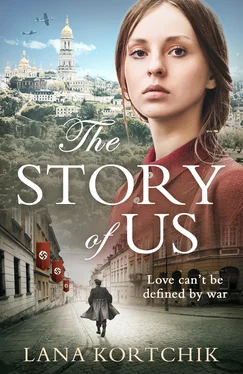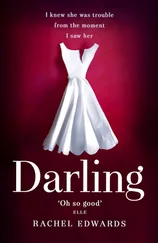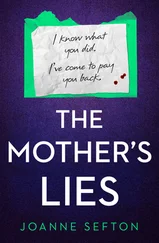As the mother thanked the old woman with tears in her eyes, two young girls and a boy approached the store from the direction of the Natural Sciences Museum. They didn’t try to jump the queue but stood quietly at the back, unsmiling and serious, as if they were attending a lecture at a prestigious university.
‘What are we queuing for?’ asked Natasha Smirnova, a tall, dark-haired waif of a girl.
‘Sausage,’ said the old woman.
‘Flour,’ said the woman with the baby.
‘Tomatoes,’ said the matronly lady. But no one seemed to know for a fact, and the line didn’t move, nor did anyone leave the store with bags of sausages, flour or tomatoes.
‘That’s good. Tomatoes will keep,’ said Natasha.
‘They won’t keep,’ replied her companion, a petite redhead with a ponytail and a sulky expression on her face. ‘We’ll have to eat them in a week.’
‘If we pickle them, we can have them all winter.’
‘Winter? This war won’t last till winter,’ said the young mother confidently.
‘You mean, we won’t last till winter,’ murmured the old woman. ‘Not if the Nazis come here.’
‘Haven’t you heard?’ said the old man directly in front of the woman with the baby. ‘Chernigov fell last week.’ The old man puffed his chest out, seemingly proud to be the bearer of such important news.
‘What are you talking about?’ exclaimed the old woman. ‘If Chernigov fell, we would have known about it. We would have heard on the radio.’ Others in line had interrupted their conversations and were now listening in, their faces aghast.
‘Believe me, comrades, Chernigov is in German hands,’ said the man, enjoying the attention. ‘I heard it from my cousin, a captain in the Red Army.’
‘My daughter is in Chernigov,’ cried the old woman, wrenching her arms.
The queue fell quiet. Chernigov was only a hundred kilometres from Kiev. If Chernigov fell, was Kiev next?
‘Let’s go home,’ said Natasha dejectedly. ‘We won’t get anything here. The queue is not even moving. Let’s just go home.’ She regretted stopping at the store and overhearing the conversation. Dread like liquid mercury spread inside her, heavy and paralysing.
The three of them made their way through the crowds towards Taras Shevchenko Park, wide-eyed at the commotion around them. Those who weren’t busy queuing for food occupied themselves by looting and robbing. The Red Army had retreated in July, and the government evacuated in August. In the absence of any form of authority, no shop, library, museum or warehouse was safe. Men, women, even children, moved from store to store, laden with sacks and boxes, searching for something valuable, preferably edible, to steal. Outside the entrance to the park, two men carried a piano and a woman struggled with a potted plant and a typewriter. Eventually, she placed the typewriter on the ground and took off with the plant. ‘It’s a palm tree,’ said Natasha, watching the woman with a bemused expression on her face. ‘I wonder what she’s going to do with it. I’d take the typewriter if I were her.’ When she didn’t receive an acknowledgement from the redhead, she added, ‘Lisa, will you look at that?’
‘Who knows what she’ll do?’ replied Lisa, shrugging. ‘Grow bananas? Barricade the door from the invading Germans?’ She chuckled but her eyes remained serious.
When the woman disappeared around the corner, Natasha turned to Lisa. ‘We should get going. If Papa realises we’ve left, we’ll be in so much trouble.’
‘Don’t worry,’ said Lisa. ‘He’s too busy searching his newspapers for news from the front to think about us. He won’t even notice we’re not there.’
Pulling Lisa by the arm, Natasha replied, ‘He’ll notice all right, especially if you don’t get a move on.’ At nineteen, she was only a year older than her sister but she was always the serious one, the more responsible one. Sometimes she admired Lisa’s impulsive character, but not today. Not on the day when the Nazis were perilously close and their father was going to kill them.
Lisa turned her back on her sister, her long red hair swinging out to whip Natasha across the face. ‘Alexei, are you coming?’ Her voice was too loud for the muted street, and several passers-by glared in her direction.
Alexei Antonov, a blond, broad-shouldered boy, had stopped at what seemed like the only market stall in Kiev that was still standing. The stall boasted a great selection of combat knives, and Alexei was in deep conversation with the owner.
‘Alexei!’ Lisa called again. Her voice quivered.
Alexei handed the stall owner some money and pocketed a knife. ‘Wait up!’ he cried, breaking into a run.
‘Dillydallying as always,’ said Lisa, her plump lips pursed together in a pout. ‘Keep this up, and we’ll leave you here.’
‘Nagging already? And we’re not even married yet.’ Pecking Lisa on the cheek, Alexei adjusted his glasses, his face a picture of mock suffering and distress.
‘Get used to it,’ said Lisa, pinching the soft skin above his elbow. He attempted a frown but failed, smiling into Lisa’s freckled face.
They paused in the middle of the road and kissed deeply. A van swerved around them. The two lovers didn’t move. They barely looked up.
‘And this is why I walk five metres behind you. It’s too embarrassing.’ Natasha stared at the ground, her face flaming. Wishing she could run home but not wanting to abandon Lisa and Alexei in the middle of the street, she was practically jogging on the spot. ‘You heard Papa this morning. Under no circumstances were we to leave the house.’
‘We had to leave the house,’ said Lisa. ‘You know we did. It was a question of life and death.’
Natasha raised her eyebrows. ‘A wedding dress fitting is a question of life and death?’
Lisa nodded. ‘Not just any fitting. The final fitting.’
‘The final fitting,’ mimicked Alexei, rolling his eyes. ‘I had to wait for you for an hour! An hour in the dark corridor.’
Lisa pulled away from him. ‘You know you can’t see me in my wedding dress before the wedding. It’s bad luck.’ She whispered the last two words as if the mere mention of bad luck was enough somehow to summon it.
‘It’s bad luck to be outside at a time like this,’ murmured Natasha.
Lisa said, ‘Don’t worry. The streets are perfectly safe. And Papa will understand.’
‘I doubt it. Just yesterday he said you were too young to marry.’
Lisa laughed as if it was the most preposterous thing she had ever heard. ‘And I reminded him that Mama was younger than me when they got married. And Grandma was only sixteen when she married Grandpa. When Mama was pregnant with Stanislav, she was the same age as you.’
Exasperated, Natasha shook her head.
Lisa continued, ‘Did you hear the dressmaker? Apparently, I have the perfect figure. Mind you, I still have time to lose a few pounds before the big day.’
Alexei ran his hands over her tiny frame. ‘Don’t lose a few pounds, Lisa. There won’t be any of you left to marry.’
Читать дальше












